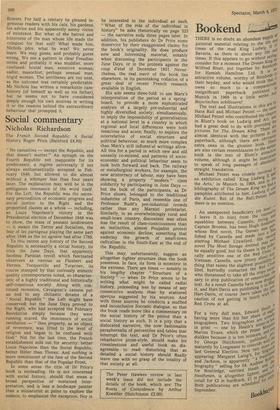Social commentary
Nicholas Richardson
The French Second Republic: A Social History Roger Price (Batsford £4.80) " No casualties — except the Republic, and that doesn't matter." An epitaph on the Fourth Republic not inapposite for its predecessor, a regime universally if not always enthusiastically accepted in February 1848, but allowed to die almost without a whimper less than four years later. The explanation may well be in the ambiguous resonance of the word itself. For the Left, the Republic was the necessary precondition of economic progress and social justice: to the Right and the propertied classes as a whole — including, as Louis Napoleon's victory in the Presidential election of December 1848 was to show, the mass of peasant landowners — it meant the Terror and Socialism, the fear of les partageux playing the same part after 1848 as the Ioi agraire had after 1789.
To this extent any history of the Second Republic is necessarily a social history, its crux the June Days, that apparently faceless Parisian revolt which fascinated observers as various as Flaubert and Herzen. Tooqueville and Turgenev, its course stamped by that curiously mimetic quality contemporaries noted, so characteristic of a highly traditional and historically self-conscious society. Along with continued recession, Cavaignac's cannon put an end to any chiliastic dreams of a "Social Republic" the Left might have conserved; but the June Days proved to the Right, who had accepted the February Revolution simply because they were running scared, the imminence of social revolution — "then property, as an object of reverence, was lifted to the level of religion and began to be confused with God." Not for the last time, the French establishment sold out for security: better Louis Napoleon than the Social Republic, better Hitler than Thorez. And nothing is more reminiscent of the fate of the Second Republic than that of the Popular Front.
In some sense the title of Dr Price's book is misleading. He is not concerned with social history, should that mean a broad perspective or sustained interpretation, and is less a landscape painter than a miniaturist at pains to explore the nuance, to emphasize the exception. Nor is he interested in the individual as such. "What of the role of the individual in history" he asks rhetorically on page 323 — the narrative ends three pages later. In addition, his publishers do Dr Price some disservice by their exaggerated claims for the book's originality. He does produce new and interesting material, notably when discussing the participants in the June Days, or in the protests against the coup d'etat of December 1851. Nevertheless, the real merit of the book lies elsewhere, in its painstaking collation of a great deal of recent French research available in English.
His aim seems three-fold: to use Marx's interpretation of the period as a springboard, to provide a more sophisticated analysis of a largely pre-industrial and highly diversified society; simultaneously, to imply the impossibility of generalisation at a national level in a country in which regional and local differences were both tenacious and acute; finally, to explore the interrelation of social structure and political behaviour, so much more complex than Marx's still influential writings allow. All this for a period in which new and old uneasily co-existed, and patterns of socioeconomic and political behaviour seem to look both forward and back. The railway or metallurgical workers, for example, the new aristocracy of labour, may have been showing a properly " modern " class solidarity by participating in June Days — but the bulk of the participants, as Dr Price shows, belonged to the traditional industries of Paris, and resemble one of Professor Rude's pre-industrial crowds rather than any Marxist proletariat. Similarly, in an overwhelmingly rural and small-town country, discontent was often less the result of class-consciousness than an instinctive, almost Poujadist protest against economic decline; something that underlay the growth of small-town radicalism in the South-East at the end of the Republic.
This may, unfortunately, suggest an altogether tighter structure than the book possesses. In face, its form is eccentric in the extreme. There are times — notably in his lengthy chapter "Structure of a Society" — when Dr Price seems to be writing what might be called radial history, proceeding less by means of any consecutive analysis than by scattered apercus suggested by his sources. And with these sources he conducts a muffled and inconclusive Socratic dialogue, so that the book reads more like a commentary on the social history of the period than a social history as such. It is a pity that a dislocated narrative, the now fashionable paraphernalia of percentiles and tables that interrupt the text, and Dr Price's often rebarbative prose-style, should make his conscientious and useful book so dis agreeable to read: disturbing that so detailed a social history should finally leave one with no grasp of the totality of that society at all.










































 Previous page
Previous page